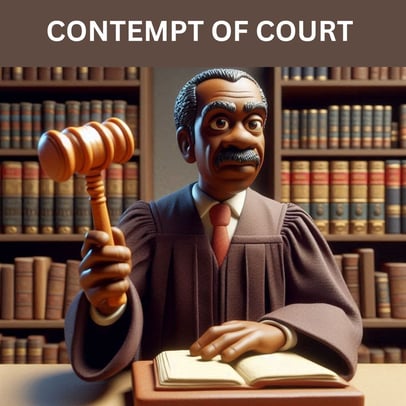The Role of Contempt of Court in Upholding Judicial Integrity
Deepika Chaneja
H.P.College Of Law, H.P.U
This blog is written by Deepika Chaneja, a Fifth-year law student of H.P.College Of Law, H.P.U


INTRODUCTION
The concept of contempt of court was derived in honour to protect and maintain the dignity of courts and big officials working in court. These constitutional bodies are here to protect our rights and must be respected. Disrespect or disobedience hinder the course of justice. Every job and its process must be respected. But fair opinions or criticism towards officials or court is acceptable at certain levels.
WHAT IS CONTEMPT OF COURT?
The word contempt usually refers to either the act of despising or having a general lack of respect for something. The ‘Contempt’ word comes from the Latin word ‘contemptus,’ which means ‘scorns. The term contempt of court means the act of not obeying an order made by a court; or lack of respect shown for a court or judge. When a person acts or says anything against the norms of the court or judges out of disrespect it is considered as contempt of court. There are two kinds of contempt of court. (i) civil contempt which means wilful disobedience to any judgment, decree, direction, order, writ, or other process of a court or wilful breach of an undertaking given to a court. (ii) criminal contempt means the publication whether by words, spoken or written, or by signs, or by visible representations or otherwise of any matter or the doing of any other act whatsoever which scandalizes or tends to lower the authority of any court. Any threat, harm, or attack against judges or court.
JURISDICTION OF CONTEMPT OF COURT
The Contempt of Courts Act, of 1971, the act was established to protect the dignity and authority of the judiciary. Section 2 defines the terms contempt of court, civil contempt, and criminal contempt of court. According to this Act, innocent publication and distribution of matter is not contempt under section 3. Section 4 and section 5 say that fair criticism and accurate reports of judicial proceedings are not contempt. But there are certain measures as to what is contempt and what is not. Punishment for contempt of court is given under section 12, which may be simple imprisonment for a term of up to six months or with a fine of up to two thousand rupees or both. An accused may also be discharged on apology made to the court’s satisfaction.
IMPORTANCE OF THE CONCEPT OF CONTEMPT OF COURT
The concept of contempt of court and its acts plays a big role in keeping up with the course of justice.
· Court and judge's dignity
The court and court officials like judges and lawyers must be respected and honoured for their work and reputation. Judges majorly play a big role in the judgments and proceedings of cases and their work and decisions must be obeyed.
· Maintain judicial system
The disobedience or disrespect of official decisions or orders will hinder the court proceedings and lead to major delays in the case and judicial process.
· Prevents violation of courts
Any matter or act that scandalizes or lowers the authority of any court is punishable under the contempt of Court Act,1971.
· Fair trial
This concept prevents violation of courts but also gives a certain limit of freedom of fair speech and expression. Such a system keeps a check on judicial proceedings.
· Defining the power of the court
This concept comes intending to define and limit the powers of certain courts in punishing for contempt of court. Courts cannot act against citizens getting hypersensitive but must always act judicially.
· Considering the fundamental rights of citizens
This Act even protects the rights of citizens, fair objection or criticism are permissible.
LANDMARK JUDGMENT
M.V. Jayarajan vs. High Court of Kerala (2015)
In 2010, the appellant gave a speech at a public gathering and used abusive words against the Kerala High Court’s judgment on banning meetings or gatherings on public roads. Kerala High court held him up for contempt of proceedings and sentenced imprisonment for up to six months. Which he then filed an appeal in the apex court. The court observed that the appellant showed no guilt or any apology towards the judges. Therefore, the court upheld the Kerala High Court decision but reduced the sentence up to four months.
CONCLUSION
The contempt of court safeguards the authority of courts. But there is a need to bring a cautious process of contempt of court to differentiate between contempt and fair speech and expression. The Act of 1971 demands a deep analysis and to make necessary changes required. The existing role of contempt of court can be misleading and confusing because its laws can overlap in India. The legislation can be beneficial and seem to power for judges and Seems to have bad effects on common people.
REFERENCE
1. Contempt of Court Act, 1971, (https://www.latestlaws.com/) 8 September 2024.
2. Nihit Singhalt, “contempt of court” (2021), SCC online (https://www.scconline.com/blog/post/2021/10/09/contempt-of-court-2/) 8 September 2024.
3. Ms. Somya Jain, “Important supreme Court judgments on contempt of court from 2010 to 2020 (2021), ipleaders (https://blog.ipleaders.in/important-supreme-court-judgments-contempt-court-2010-2020/#Hari_Singh_Nagra_v_Kapil_Sibal) 8 September 2024.
4. “Contempt of court in India” (2023), Drishti judiciary (https://www.drishtijudiciary.com/editorial/contempt-of-court-in-india#:~:text=Under%20Section%202(b)%20of,the%20authority%20of%20any%20court.) 8 September 2024.
5. Amanat Raza, “Contempt of court”(2019), ipleaders (https://blog.ipleaders.in/contempt-of-court-2/) 8 September 2024.
